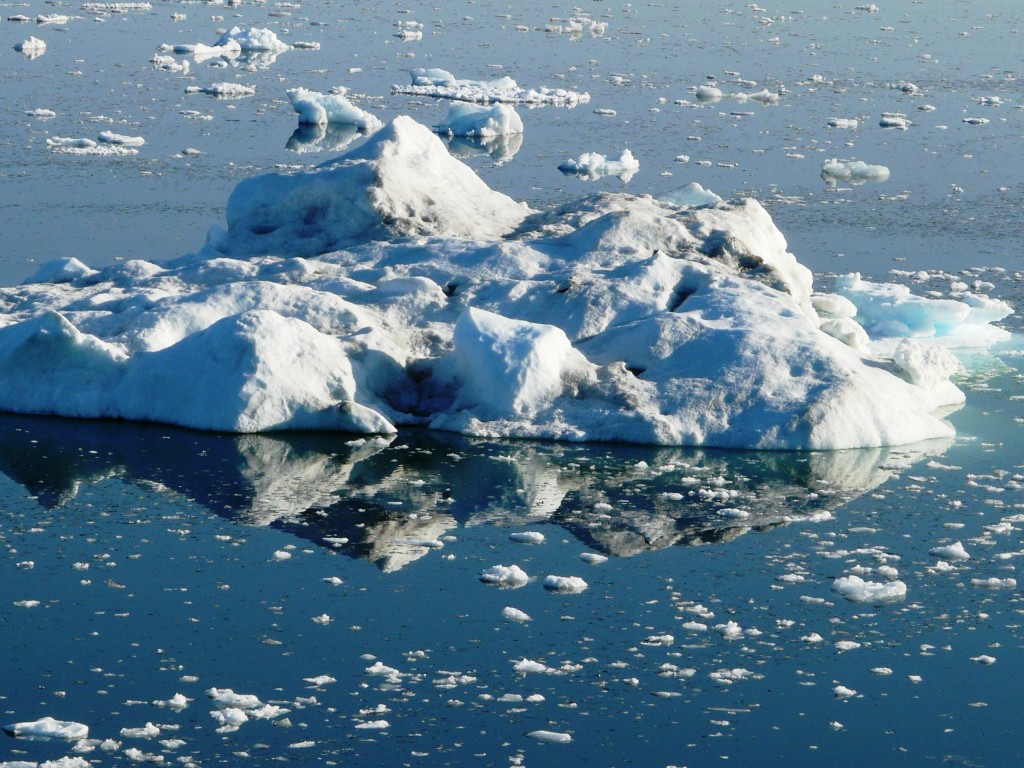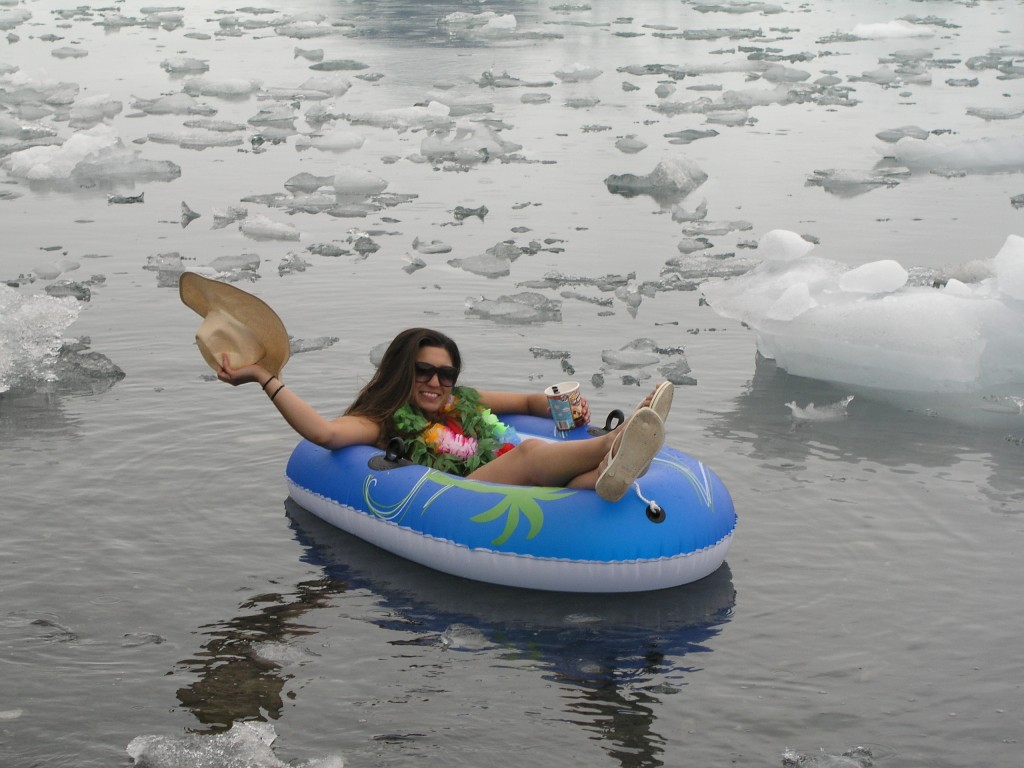Why melting Arctic ice leaves us cold!
Since I attended a workshop on “Creating a Climate for Change” in Tromso in January, I have been thinking a lot about the psychological reasons why things are not moving forward on climate change. Although scientific knowledge is growing all the time, public perception of the need for action has not kept pace. Even in regions of the Arctic where climate change is very visible, a lot of people seem to be unwilling to take it on board. Of course there are people who will benefit to some extent. But the danger of a warming world for future generations and the environment is hard to avoid. Yet there is what you could all collective inaction. Is it all in the mind? I touched on this briefly in a post from Tromso, but feel it is important enough to come back to in some more detail here.
In connection with climate change, the word “denial” is highly emotionally charged. Her book entitled “Living in Denial: Climate Change, Emotions, and Everyday Life” brought American sociologist Kari Norgaard storms of hate mail from right-wing climate skeptics. Yet the academic from the University of Oregon is not concerned with this minority group.
“I think it is a very disingenuous debate that has been manufactured by political interests who stand to lose as the economy shifts away from fossil fuels. What they’re doing is trying to make it sound like there is a debate – but actually there is no debate”, Kari told me in an interview. What she wants to understand is why the vast majority of people who do not dispute the existence of human-induced climate change still fail to translate that knowledge into action in their own lives.
“How is it possible that we have so much knowledge about the urgency of climate change, yet when you look around, it seems that either nobody knows or nobody cares?”. Norgaard sees an “incredible disconnect between the moral, social and environmental crisis of climate change and the lack of a widespread sense of a need for urgent action.” Humans, says Norgaard, are “not getting it” and “carrying on regardless”.
Refusing to accept the obvious?
The American researcher spent ten months studying a community in northern Norway, a country where media literacy, political participation and climate awareness are high. The winter she spent there was unusually warm and the snow came two months later than usual, causing problems for the community’s two main revenue sources farming and tourism. Yet Norgaard observed that the phenomenon of climate change was “invisible in social or political life”. Although stories in the media linked the warm winter explicitly to global warming, residents did not react by contacting politicians or cutting down on fossil fuels. Norgaard attributes this lack of response to what she calls “socially organized denial”: although people are informed about the findings of climate science, this knowledge remains disconnected from political, social, and private life. She sees this as symbolic of how citizens of wealthier, industrialized countries are responding to global warming. In her home county the USA, regions are already experiencing climate impacts with economic consequences. Yet people do not want to accept that it could have something to do with their lifestyle and require unpleasant action.
“People have a real fear about what it means for the world and their future. Then a sense of guilt comes up because they realize that our high quality of life through our use of fossil fuels is directly linked to this problem. Then there is a sense of helplessness, because it feels so large and we see the lack of political response.”
People prefer, it seems, to live as though they did not have the worrying evidence of climate change. Norgaard compares this behaviour to people’s ignoring the holocaust or the dropping of the atomic bomb during World War II: She thinks we are trying to protect ourselves by avoiding unpleasant facts and the need to do something about them.
The greatest communication failure of all time?
Per Espen Stoknes is a psychologist at the Center for Climate Strategy of the Norwegian Business Institute NBI. He says the communication of climate science has failed to take account of psychological defence mechanisms of the sort Norgaard describes. “For a long time it was hoped that just the facts would be sufficient. But there are psychological barriers which stop people taking to heart what climate science is telling us, and these have been underestimated”, he told me in an interview.
Stoknes says people perceive climate change as something distant, in time and place. An IPCC (intergovernmental Panel on Climate Change) forecast for 2100 seems a long way away. Melting sea ice or sea level rise in places like Bangladesh or the Maldives seem geographically very remote.
Paradoxically, the better the facts on climate change become, the less people seem to care. Stoknes quotes surveys going back to 1989 in Norway which show a decrease in people’s concern about the greenhouse effect and climate change.”Only four in ten now see it as a problem”.
Another interesting statistic Stoknes quotes shows the public has the impression only 55 percent of climate scientists agree on global warming. In reality, the figure is 97%.Getting the message about climate change across is the “greatest communication failure of all time”, says Stoknes. He says scientists need to lecture people less and engage more in dialogue and discussion. Media coverage also plays a role: “We know about 85 percent of all the media reports about climate have been framed as doom and disaster. We know this gives people an aversion and leads to avoidance behaviour. We stop wanting to hear about the issue”.
This would appear to fit with a downward slide in climate coverage around the globe, says Elisabeth Eide from the University of Bergen, author of various works on climate change in the media. She refers to “climate fatigue” in society at large and in journalists in particular.
How to motivate people to combat climate change?
If these researchers are correct and the lack of climate action is mainly psychologically motivated, the problem requires psychological solutions. Stoknes says we have to cross the “doom and disaster barrier” and point the way forward. Norgaard too argues for more positive examples and indications of what we could do to change things.”.
Psychologist Stoknes stresses the power of social norms to change behaviour: He suggests campaigns that make people compete with their peers – neighbours, other towns, friends, relatives, at being climate-conscious. He reports the success of an app where people can record and compare how much energy they have used. Another possibility is to make “greener” options the default in all aspects of daily life. “If the normal way a printer works is to use both sides of the paper, for instance, people will do that. Not if they have to change a setting” says Stoknes. A mind-shift away from portraying climate change as a paralysing threat towards stressing practical behaviour that would change the situation could avoid triggering what the experts call “the emotional need for denial”. Any thoughts on that?

















